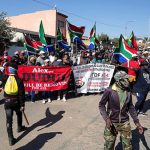Johannesburg – The tranquil facade of South Africa's bustling cities has been pierced by the chilling reality of international terrorism, as the US Department of the Treasury has unleashed a wave of sanctions against three individuals allegedly linked to the expanding reach of ISIS. This move sends a ripple effect across the continent, highlighting the insidious nature of the terrorist group's operations and the potential for its influence to infiltrate even the most seemingly secure corners of Africa, celebgossip.co.za has learnt.
The sanctions target two individuals based in South Africa and one in the Democratic Republic of Congo (DRC). The US Treasury alleges these individuals are key players in ISIS's financial network, facilitating the movement of funds, recruitment, and even violent activities in the region.
Among those targeted is Abubakar Swalleh, a South African and Zambian national described as an ISIS operative. Swalleh is accused of playing a crucial role in the physical transfer of funds from South Africa to the DRC, acting as a conduit for ISIS's financial lifeline in the region. His alleged activities extend beyond mere financial transactions, as he is also accused of facilitating the movement of ISIS-affiliated individuals between Uganda and South Africa.
"The individuals sanctioned today are being designated pursuant to executive order (EO) 13224, as amended, which targets terrorist groups and their supporters," the US Treasury stated in its announcement.
The US Treasury also alleges that Swalleh's activities are closely intertwined with Mohamed Ali Nkalubo, an ISIS commander based in the DRC. Nkalubo, according to the US Treasury, relies heavily on Swalleh to move funds and recruit individuals for the ISIS DRC affiliate. The US Treasury further alleges that Swalleh, under Nkalubo's direction, relocated to South Africa, where he became involved in kidnapping for ransom and robberies, a disturbing indication of the group's willingness to engage in criminal activities to fund its operations.
The third individual targeted by the sanctions is Zayd Gangat, also believed to be a South African-based ISIS facilitator and trainer. The US Treasury alleges that Gangat plays a vital role in bolstering ISIS's capabilities in the region, providing training and support to its operatives. These allegations paint a grim picture of the extent to which ISIS has infiltrated South Africa, establishing a network of individuals willing to engage in violent and criminal activities to further the group's agenda.
The US Treasury's announcement also sheds light on the financial strategies employed by ISIS in South Africa. They allege that ISIS leaders in the country have used robbery, extortion, and kidnapping for ransom operations to generate funds for the group. This highlights the group's adaptability and its willingness to exploit vulnerabilities in South Africa's security infrastructure to finance its activities.
The sanctions also target Hamidah Nabagala, a DRC-based individual accused of acting as an intermediary for ISIS financial flows in central Africa. The US Treasury alleges that Nabagala played a key role in funding the October 2021 bombing in Kampala, Uganda, which resulted in one fatality and several injuries. This accusation underscores the potential for ISIS's reach to extend beyond the DRC, posing a serious threat to regional security.
"Today's action underscores the crucial work of the Counter ISIS Finance Group and the importance of effective information sharing among coalition countries to target ISIS's facilitation networks," stated Brian E Nelson, Under-Secretary of the Treasury for Terrorism and Financial Intelligence.
The sanctions imposed by the US Treasury have far-reaching consequences for the individuals targeted. All property and interests in property owned, directly or indirectly, by the sanctioned individuals, as well as entities that are owned, directly or indirectly, 50% or more by them, individually, or with other blocked persons, must be blocked and reported to OFAC (Office of Foreign Assets Control).
OFAC regulations typically prohibit all dealings by US people or within the country that involve any property or interests in property of designated or blocked persons. This includes all US citizens and permanent resident aliens regardless of their location, all persons within the US, and all US-incorporated entities and their foreign branches.
The US Treasury's actions send a strong message to ISIS and its supporters, demonstrating the international community's commitment to combatting the group's activities. However, the sanctions also highlight the challenges facing South Africa in combating the spread of extremism within its borders. The country's law enforcement agencies and intelligence services face the daunting task of identifying and disrupting ISIS networks operating within the country, while also addressing the underlying social and economic factors that may contribute to the group's appeal.

Follow Us on Twitter










